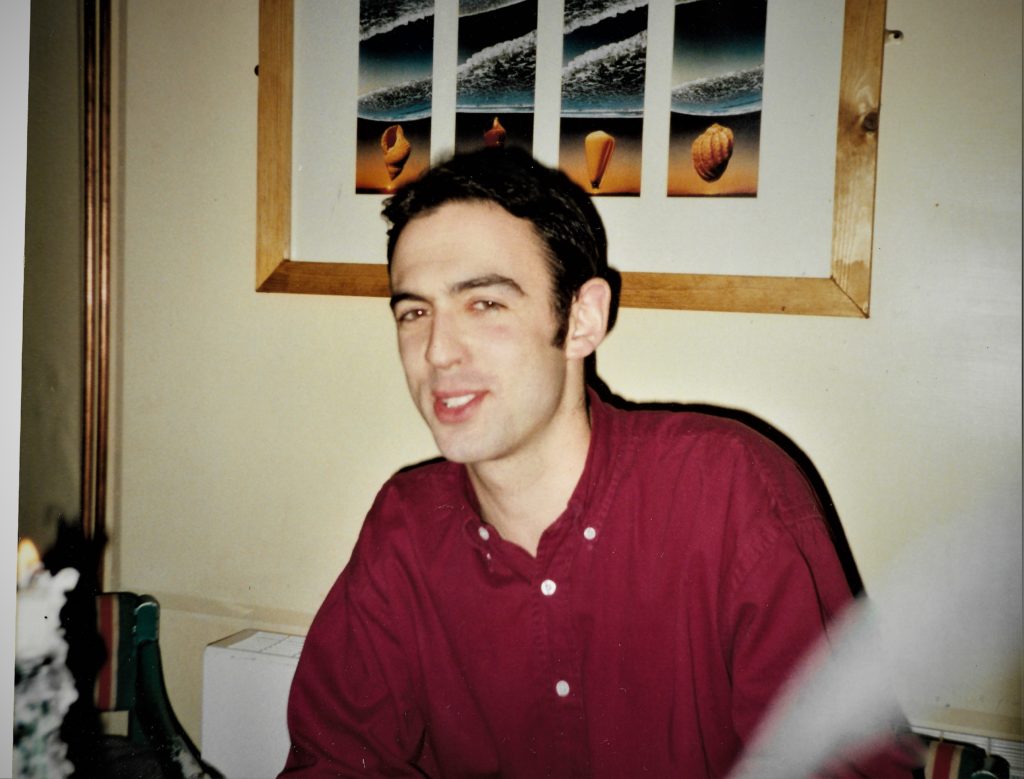Becoming James Ashton – Financial Journalist and Podcaster
James Ashton (MA 1997) describes here how the attributes he needed to become a successful financial journalist, author and podcaster were ‘first hewn at St Andrews’.

When I look back on my years in St Andrews I am content that I graduated with a good degree because I never gave myself the chance to get a great one. That is because for every English essay I submitted I am sure I published twice the volume of words in The Chronicle, the university’s student newspaper during my time.
But life is about choices and I firmly believe that what St Andrews has to offer, then and now, cannot be distilled down into a single grade. What I learnt outside the lecture hall and tutorials easily matched what I gained within them.
My memories of the place – bracing winds, headache-inducing sunshine, sullen grey masonry – and of the people – many firm friends for life – overshadow what we got up to. Even now, approaching 25 years on, the majority spent as a financial journalist and author, I ponder how the time in our hermetically sealed bubble flashed by.
On the strength of its English department and all-round reputation, I made St Andrews one of my university choices. But when I visited, it was clear here was something special and it rapidly became first pick. Beyond Beowulf and Byron, I was already eager to see what else was going on.
As a teenager my first love was radio, but I soon discovered that the two bus rides needed to lend a hand at Tay FM in Dundee was beyond a lethargic fresher. I thought it would be better to focus my efforts on the student newspaper The Chronicle, where I wrote about music and then news, and was elected editor in my second year.
It was an all-consuming activity. The Chronicle was independently financed by strong advertising and sales, a gift for any publication, which gave the team ample leeway to challenge university elders, student politicians and have some fun. I can still taste the late-night chips and cheese as we wrestled with overheating Mac computers to put out another edition of what went on to become The Saint.
After St Andrews, I took a one-year postgraduate diploma in newspaper journalism at City University in London. Life in the capital was a shock to the system after the Auld Grey Toon. Morning shorthand was a necessary evil but the tasks I remember fondly are the ones that called for some ingenuity: “Here’s a page from the London A-Z – go and find a story”. Better still, at City I won a scholarship to work at the Daily Iowan in the US Mid-West, where the editor thought it fun to get the Brit to review the local Shakespeare production.
In common with St Andrews, City University has great networks. My course was seen as a good place for new hires by the nationals and similar. I was fortunate my first job at Reuters, covering the advertising and media industries as the dotcom bubble inflated, was stuck up on the department noticeboard.
I had never set out to specialise in financial journalism, but when the Reuters job ended, it made sense to write for work to City Editors who I thought would most value the news agency’s brand. The Scotsman, Daily Mail, Sunday Times, Evening Standard, Independent and Telegraph followed, each with increased responsibility and their own editorial rhythm.
The Sunday Times, which offered just one chance a week to deliver up market-moving scoops and must-read interviews, was relentless. But as City Editor of the Standard my challenge was just as exhilarating: to curate and explain that morning’s corporate and economic announcements at little notice for editions that were piled on the streets by mid-afternoon ready for the commuter crowd.
Along the way, I have had a front row seat at big business deals and the 2008–2009 financial crash, and I’ve interviewed Sir Richard Branson at 35,000 feet, the Bank of England Governor and Facebook’s Sheryl Sandberg in the heart of Silicon Valley. All the while, I hope I’ve been inquisitive, bold, energetic, collegiate and fair – all attributes first hewn at St Andrews.
In the last year or so I’ve published two books, with a third now underway. The first tells the story of the FTSE share index and the shift from active to passive investing, written with the company’s founding CEO. The second, entitled The Nine Types of Leader, distils all I’ve observed from the CEOs I have met: how they get to the top, how they stay there and the different styles of leadership they employ. I’ve also given podcasting a try. I have now featured the career stories and tips of more than 60 CEOs – including those from the Royal Navy, Marks & Spencer and the National Trust – on my podcast Leading with James Ashton. More speaking and coaching work has followed.
The glib advice for anyone considering a career in communications or the media is: don’t! It is oversubscribed and it can be hard to scratch a living. But that is to ignore the adrenalin rush of deadlines, the doors that can open and the opportunities there are for travel. Gaining understanding and telling stories are skills adaptable to numerous professions.
Undergraduates with the media in mind need to gain early experience. I worked at several regional newspapers outside term time. Just turning up and trying to be useful always pays dividends. Getting noticed is helpful and that’s easier today with blogging or podcasting. And start knocking on doors. Making asks without being pushy is crucial, whether you are trying to land a press interview or a job. And finally, a well written email or letter sent to the right person still works wonders, so give it a go.
View The Nine Types of Leader on alumni authors.
